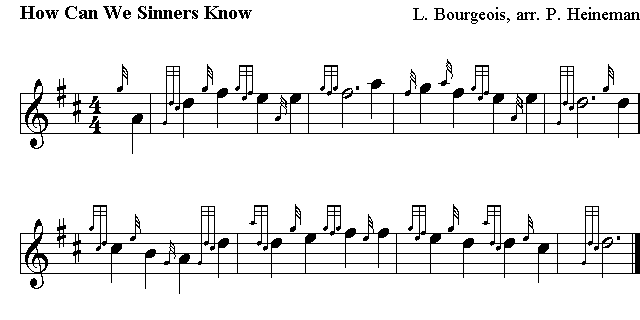
Best viewed in
Internet Explorer
Music (PDF)
Midi
Music (BMW)
Back to

Updated
09/04/2020 |
How Can We
Sinners Know

Charles Wesley |
The lyrics for “How Can We
Sinners Know” were written by Charles Wesley (see
Blow Ye the Trumpets Blow for a biography).
The music was composed by Loys
(Louis) Boureois (c. 1510 to 1515 –
1559 or later). Bourgeois was a French composer and music
theorist of the Renaissance. He is most famous as one of the
main compilers of Calvinist hymn tunes in the middle of the 16th
century. One of the most famous melodies in all of Christendom,
the Protestant doxology known as the Old 100th, is commonly
attributed to him.
Next to
nothing is known about his early life. His first publication,
some secular chansons, dates from 1539 in Lyon. By 1545 he had
gone to Geneva (according to civic records) and become a music
teacher there. In 1547 he was granted citizenship in Geneva, and
in that same year he also published his first four-voice psalms.
In 1549 and 1550
he worked on a collections of psalm-tunes, most of which were
translated by Clement Marot and Théodore de Bèze. The extent to
which he was composer, arranger or compiler was not certain,
until a long-lost copy of the Genevan Psalter of 1551 came to
the library of the Rutgers University. In an Avertissement
(note) to the reader Bourgeois specifies exactly what his
predecessors had done, what he had changed and which were his
own contributions. He is one of the three main composers of the
hymn tunes to the Genevan Psalter. |
Unfortunately, he
fell afoul of local musical authorities and was sent to prison on
December 3, 1551 for changing the tunes for some well-known psalms
"without a license." He was released on the personal intervention of
John Calvin, but the controversy continued: those who had already
learned the tunes had no desire to learn new versions, and the town
council ordered the burning of Bourgeois's instructions to the singers,
claiming they were confusing. Shortly after this incident, Bourgeois
left Geneva never to return: he settled in Lyon, his Geneva employment
was terminated, and his wife tardily followed him to Lyon.
While in Lyon,
Bourgeois wrote a fierce piece of invective against the publishers of
Geneva. By 1560 he had moved to Paris. Curiously, his daughter was
baptized as a Catholic, and also in 1560 a Parisian publisher produced a
volume of secular chansons by the composer—a form he had condemned as
"dissolute" during his Geneva years. No records of his life survive
after 1560, and one source gives his date of death as 1559.

Lyrics by Charles Wesley
|
|
How can we sinners know
Our sins on earth forgiven?
How can my gracious Savior show
My name inscribed in heaven?
What we have felt and
seen,
With confidence we tell,
And publish to the ends of earth
The signs infallible.
We who in Christ
believe
That He for us hath died,
We all His unknown peace receive
And feel His blood applied.
Exults for joy our
rising soul,
Disburthened of her load,
And swells, unutterably full
Of glory and of God.
His love surpasses
far
The love of all beneath,
We find within, and dare
The pointless darts of death.
Stronger than death,
or sin, or hell,
The mystic power we prove,
And conquerors of the world we dwell
In heaven, who dwell in love. |
We by His Spirit
prove
And know the things of God,
The things which freely of His love
He hath on us bestowed.
The meek and lowly
heart
That in our Savior was,
To us that Spirit doth impart
And sign us with His cross.
Our nature’s
turned, our mind
Transformed in all its powers,
And both the witnesses are joined,
The Spirit of God with ours.
His glory is our
sole design,
We live our God to please,
And rise with filial fear divine
To perfect holiness.
The Spirit of my
God
Hath certified Him mine,
And all the tokens showed,
Infallible, divine.
Hereby the
pardoned sinner knows
His sins on earth forgiven,
And thus my gracious Savior shows
My name inscribed in Heaven.
|
|



